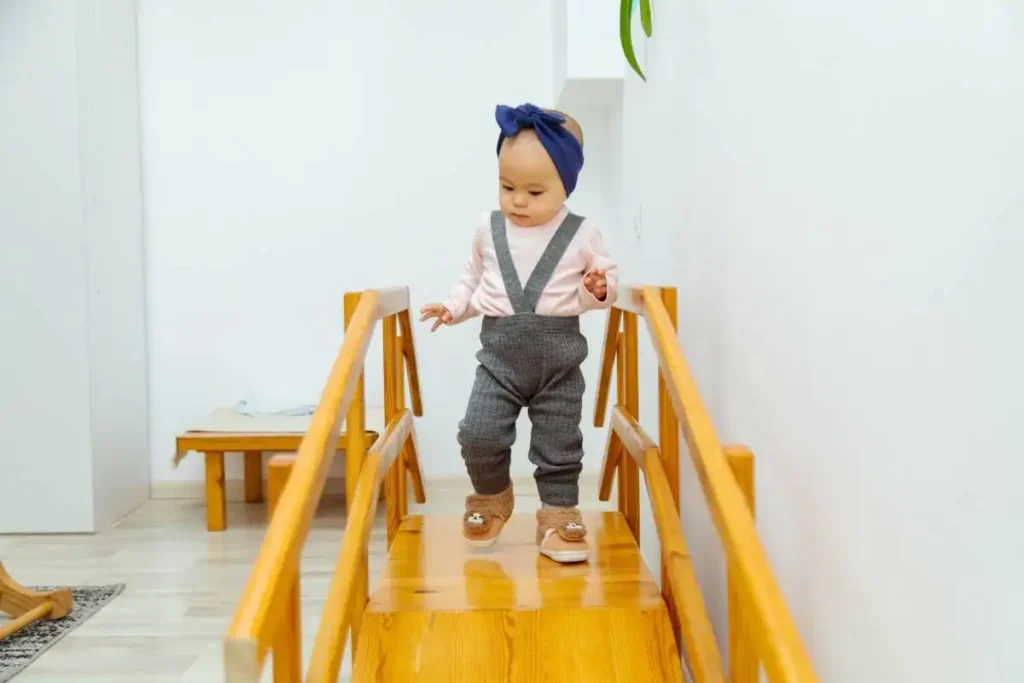The world of childhood is marked by a sense of exploration and discovery, where every movement serves as a stepping stone towards understanding one’s environment and developing essential life skills.
For typical toddlers, the ability to run, jump, and engage in playful activities comes naturally, fostering a sense of independence and joy. However, for toddlers diagnosed with autism spectrum disorder (ASD), this journey can be fraught with obstacles, particularly when it comes to motor skill delays.
This article seeks to unravel the complexities surrounding motor skill development in toddlers with autism, shedding light on the underlying causes, common challenges faced, and effective strategies to promote their growth and well-being.
Spectrum of Motor Skill Delays in Autism
Autism spectrum disorder is characterized by a diverse range of symptoms that manifest differently in each child. While some individuals may exhibit profound difficulties in communication and social interaction, others may present with milder challenges yet still struggle significantly with specific aspects of daily functioning.
One key feature often observed in toddlers with autism is the presence of motor skill delays—an umbrella term encompassing both gross and fine motor impairments.
Motor skills serve as fundamental building blocks for physical interactions within our surroundings. Gross motor skills involve the use of larger muscle groups for movements such as running, jumping, and climbing, while fine motor skills pertain to smaller movements involving the hands and fingers, such as grasping objects or manipulating small items.
In toddlers with autism, these skills may not develop typically, leading to significant implications for various aspects of their lives.
The Connection Between Motor Skills and Development
Motor skills are intricately linked with cognitive, emotional, and social development. They lay the foundation for self-care abilities, peer interactions, and academic success.
Children with well-developed motor skills are better equipped to engage in play, participate in group settings, and communicate effectively. Conversely, when motor delays in autistic toddlers occur, it can create barriers to learning and social engagement.
Understanding the connection between motor skills and overall development emphasizes the importance of addressing these delays early on. By recognizing signs of motor delays in autism—such as difficulty with balance, coordination, or manipulation of objects—parents and caregivers can seek timely intervention, paving the way for improved outcomes.
Signs and Symptoms of Motor Skill Delays in Autism
Identifying motor skill impairment in autism requires keen observation. Some common signs of motor delays in autism include:
- Difficulty achieving developmental milestones such as crawling, walking, or running
- Awkward gait or poor balance while standing or moving
- Challenges with fine motor tasks like holding a pencil, tying shoelaces, or using utensils
- Clumsiness during play or social interactions, potentially leading to frustration or avoidance of physical activity
Recognizing these signs is vital for guiding parents toward appropriate support systems tailored to the unique needs of their child.
The Underlying Causes of Motor Skill Delays
Children with autism often experience sensory processing differences, whereby they may overreact or underreact to sensory stimuli in their environment. These sensory variations can have a profound impact on motor skill development.
For instance, a toddler who is hypersensitive to touch may find certain textures uncomfortable, leading them to avoid engaging in activities that could promote fine motor skills, such as playing with playdough or drawing. Conversely, a child who exhibits hyposensitivity might crave sensory input and engage in risky physical behaviors, potentially resulting in injuries that further hinder their development.
Understanding how sensory processing affects motor skills is crucial for creating tailored interventions. By addressing sensory sensitivities and incorporating sensory integration activities into therapy, caregivers can foster a more conducive environment for skill development.
Muscle Tone and Coordination Difficulties
Another factor contributing to motor skill delays in toddlers with autism is the presence of atypical muscle tone. Many children with autism may exhibit either hypotonia (decreased muscle tone) or hypertonia (increased muscle tightness).
Hypotonia can lead to reduced strength and stability, making activities that require postural control and coordinated movements challenging.
Coordination difficulties are also prevalent in this population, affecting their ability to perform tasks requiring precise movements. Activities such as throwing balls, catching, or even simple hand-eye coordination tasks can become frustrating hurdles instead of joyful experiences.
Addressing these concerns through targeted physical therapy can help bolster muscle strength and improve coordination, allowing children to engage more fully in daily activities.
Cognitive and Executive Functioning Impairments
Cognitive delays and executive functioning impairments are frequently observed in toddlers with autism, impacting their ability to plan, organize, and execute motor tasks. Deficits in executive functioning can lead to challenges with motor planning—essentially determining how to sequence movements effectively.
For example, a toddler may have difficulty following a simple instruction such as “jump up and down” due to challenges in mental sequencing. This inability to organize movements can manifest as clumsiness and hesitation during playtime, discouraging participation and limiting opportunities for skill development.
Language development often correlates with motor skill progression. A toddler with delayed language may struggle to understand verbal cues or instructions related to motor tasks, further complicating their ability to engage in physical activities.
Common Motor Skill Challenges in Toddlers with Autism
Gross Motor Skills
Gross motor skills encompass a wide array of physical activities, from locomotion to maintaining balance. The challenges faced by toddlers with autism in this domain can be particularly pronounced.
1. Delayed Walking and Running
One of the most notable gross motor skill issues in autism is a delay in achieving independent walking. Many toddlers with autism may take their first steps later compared to their typically developing peers, causing concern among caregivers. Once walking is established, they may continue to exhibit an awkward gait characterized by poor balance and coordination while running.
Such delays can have long-lasting effects on socialization, as physical play with peers often involves running and chasing games. Encouraging outdoor play and providing safe spaces for exploration can promote confidence in gross motor abilities, fostering deeper connections with peers.
2. Difficulty with Locomotion
Locomotion involves a range of skills, including crawling, climbing, and jumping, all of which can be affected by the challenges associated with autism. These skills require complex coordination and spatial awareness, skills that may be underdeveloped in toddlers on the spectrum.
A toddler experiencing difficulties in crawling may miss opportunities to strengthen core muscles, balance, and coordination. Likewise, challenges jumping or hopping can inhibit participation in group activities or sports, leading to feelings of isolation or frustration. Engaging children in playful activities that encourage movement—like obstacle courses or dance—can nurture these crucial skills.
3. Poor Postural Control
Maintaining proper posture is essential for navigating everyday tasks, from sitting at a table to transitioning between positions. Toddlers with autism often struggle with postural control, making it difficult to sit upright, stand confidently, or transition smoothly from one position to another.
Supporting postural control through targeted exercises that focus on strengthening core muscles and enhancing body awareness can provide toddlers with the stability they need to thrive in their environments. Activities such as yoga, balance exercises, and play-based movements can be valuable tools for developing better postural skills.
Fine Motor Skills
Fine motor skills play a pivotal role in enabling toddlers with autism to interact with their environment effectively. Yet many face significant hurdles in mastering these essential abilities.
1. Delayed Hand-Eye Coordination
Hand-eye coordination is foundational for various daily activities, including feeding oneself, dressing, and participating in creative play. Many toddlers with autism may experience delays in developing this skill, which can lead to frustration during mealtime or play sessions.
Encouraging practice through engaging activities—such as stacking blocks, threading beads, or using scissors—can help build confidence and proficiency in hand-eye coordination. Caregivers can create opportunities for practice within playful contexts, allowing toddlers to refine their skills without the pressure of performance.
2. Difficulty with Manipulation
Manipulative tasks such as buttoning clothes, zipping jackets, or using utensils pose unique challenges for toddlers with autism. Impaired fine motor control can result in frustration or avoidance, leading to a reluctance to engage in self-help tasks.
Breaking down these tasks into smaller, manageable steps can be beneficial. For example, caregivers can support toddlers in practicing buttoning by starting with larger buttons on soft fabric or using adaptive clothing designed for easier access. Celebrating small successes can boost confidence and motivation to tackle more complex tasks over time.
3. Challenges with Handwriting
Writing is a complex skill that demands coordinated movements of the fingers and hand, along with cognitive processes. For many children with autism, handwriting can feel insurmountable due to motor skill difficulties, including problems with grip pressure, letter formation, and overall motor control.
By offering opportunities for multisensory writing experiences—such as using textured materials or writing in sand—caregivers can make the process more engaging. Using adaptive writing tools, such as pencil grips or thick markers, can also alleviate some of the difficulties experienced during handwriting tasks.
Nurturing Motor Development in Toddlers with Autism
Early Intervention
Early intervention is critical in addressing autism-related motor development delays. Research consistently shows that the earlier a child receives support for their developmental challenges, the more positive the outcomes.
Engaging in interventions that target motor skills—whether through occupational therapy, physical therapy, or specialized programs—can provide children with the tools they need to succeed. Occupational therapists assess individual needs and design tailored interventions that incorporate sensory integration techniques, helping toddlers navigate their unique motor challenges.
Multidisciplinary Approaches to Support
Recognizing that toddlers with autism often face challenges in multiple domains, a multidisciplinary approach is essential. Collaborating with various professionals—including speech therapists, behavioral specialists, educators, and pediatricians—creates a comprehensive support network.
This teamwork ensures that interventions are cohesive and coherent, addressing not only the motor skill deficits but also the interconnected sensory, cognitive, and social challenges that may arise. Regular communication among team members aids in tracking progress and adapting strategies to meet evolving needs.
Strategies for Parents and Caregivers
Creating a nurturing environment at home is equally important in promoting motor skill development. Here are several effective strategies for parents and caregivers:
- Create a Sensory-Friendly Space: By minimizing overwhelming sensory stimuli in the home, caregivers can foster a safe space for exploration and play. Incorporate calming elements, such as soft lighting, noise-reducing headphones, or tactile objects, to support sensory regulation.
- Encourage Play and Exploration: Play is inherently valuable for motor skill development. Provide age-appropriate toys, encourage outdoor play, and offer opportunities for movement-packed activities. Simple games like tag, hide-and-seek, or dancing can promote gross motor skills in enjoyable ways.
- Break Down Tasks: For tasks that may seem overwhelming to toddlers, breaking them down into smaller steps facilitates success. Whether dressing, eating, or engaging in creative projects, incremental guidance can help them navigate through seemingly complex activities.
- Utilize Visual Aids: Visual supports, such as picture schedules or cue cards, can aid comprehension and bridge communication gaps. By presenting expectations visually, toddlers can better understand what is required, promoting greater engagement in motor skill activities.
- Foster Patience and Encouragement: Recognizing that progress may come slowly is crucial. Celebrate small achievements, maintain a positive attitude, and provide ample encouragement along the way. Cultivating resilience helps children remain motivated as they work toward mastering new skills.
Conclusion
Navigating the labyrinth of motor skill delays in toddlers with autism requires understanding, patience, and a commitment to tailored support. The journey may present challenges, yet it is also a pathway filled with opportunities for growth and discovery. By acknowledging the multifaceted nature of motor skill development, we can empower toddlers with autism to explore their potential, enhance their physical abilities, and foster meaningful connections with their environment and peers.
As we celebrate the milestones—no matter how small—we reaffirm the belief that every child has the right to engage with the world around them, unlocking their unique talents while embracing the vibrant tapestry of childhood exploration. Through compassionate intervention, dedicated support, and a holistic approach, we can illuminate the path forward, guiding toddlers with autism toward brighter futures rich with possibility.







